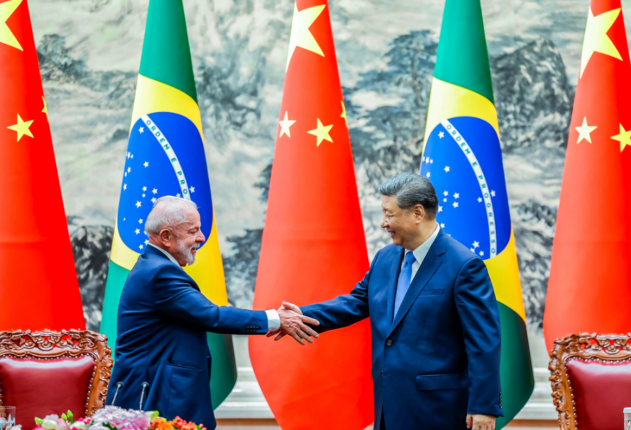-
The Cost of Ceding the Field to China on Climate Change
August 5, 2025 By Scott Moore
Summer is often a time for grim climate milestones, as ever-more intense heatwaves scorch large swathes of the planet. But this year, the bad news arrived earlier than usual when the United States refrained from sending representatives to the UN-sponsored climate talks in Bonn, Germany, for the first time in the talks’ 30-year history. The intercessional talks are in some ways more important ever than the more widely reported on climate COPs because they are where many especially tricky issues are negotiated. The Trump Administration’s unilateral withdrawal from international negotiations is bad news for the climate. But it is even worse news for US national security. Climate diplomacy is a big part of soft power and influence, and Washington is rapidly losing out to Beijing.
The US is the world’s largest historical source of greenhouse gas emissions, but it has also been the lead in the fight against climate change. President Trump has been clear that he views this legacy as misguided because the main international climate agreement, the Paris Agreement, obliges the United States to contribute funds to support decarbonization and climate adaptation in other countries.
On the first day of his second term, the president issued an executive order withdrawing the United States from the Paris Agreement for a second time, charging that it “steer[s] American taxpayer dollars to countries that do not require, or merit, financial assistance in the interests of the American people.” But the costs of completely ceding climate governance to China’s influence are equally high.
China is Wielding Climate Diplomacy as a Tool in Strategic Competition
While America has all but abandoned climate diplomacy, China’s leaders are leaning into an enthusiastic audience, helping to translate climate leadership into support for Beijing’s other foreign policy priorities. Last month alone, China embarked on a flurry of climate diplomacy tactics, engaging leaders from Latin America to the Pacific Islands. Xi Jinping welcomed Brazilian President Lula de Silva to Beijing where Xi heaped praise on Brazil’s work to host a major international climate conference in December.
Meanwhile, China’s Foreign Minister hosted nearly a dozen representatives of highly strategic Pacific Island countries, pledging to undertake 100 climate action projects throughout the Pacific. “China,” he pointedly mentioned, “fully recognizes the vulnerability of the economic and social development of the Pacific Island countries in the face of the climate crisis.”
What China’s leaders have grasped is that most countries, especially developing ones, see climate change as a strategic and often existential threat. This is especially true for low-lying islands like those that Beijing is courting – and that America would depend on to project military power in the event of a conflict.
China increasingly appears to link climate diplomacy with other efforts to expand its influence, not only in strategic areas like the South Pacific and Taiwan, but also in the technological domains that both China and the US believe will determine who prevails in strategic competition. The Joint Statement from Beijing’s Pacific Island meetings includes innocuous-sounding pledges to expand cooperation on climate change alongside a statement that “Taiwan is an inalienable part of China’s territory.” The official read-out from Xi’s meeting with Lula, meanwhile, endorses Beijing’s proposals for AI and cyber governance immediately before pledging China’s support for Brazil’s climate conference.
In many ways, it is perverse that China should gain soft power advantage from climate change, given that it has been the world’s largest single emitter of greenhouse gas emissions since 2006. It also contributes a far smaller proportion of financing for decarbonization and climate adaptation than either the size of its economy or its per capita income suggests that it should. But unlike in the United States, where climate policy has become a partisan football, China has devoted large-scale investments not only in climate diplomacy but also clean energy. Its firms dominate sectors from solar panels to electric vehicles. Beijing skillfully weaves together its commercial and diplomatic interests, dangling access to inexpensive Chinese-manufactured clean technology alongside appeals to bolster its political influence.
A Strategic Climate Agenda the US Can Act on Now
Fortunately, it is not too late for the United States to prevent China from securing a permanent soft-power advantage in climate diplomacy. It might even be possible to do so on grounds acceptable to the Republicans who currently control Washington’s levers of power.
While rejoining the Paris Agreement should be a long-term goal, in the interim the US government should take modest steps like restoring dialogue with countries in the highly strategic Pacific Islands region on issues related to climate change. The United States should also take a page out of China’s book by combining climate diplomacy with export promotion, using engagement in international energy dialogues to boost exports of American-made clean technology and build on US advantages in areas like small modular nuclear reactors. Doing so would strengthen the political case for US involvement in international climate issues, while helping to blunt China’s seductive offer of both clean technology and diplomatic support for climate action.
The current administration may not care much about climate change itself, but it certainly cares about ceding influence to its main adversary on the world stage. The two are closely linked, and if the United States wants to compete with China, it cannot afford to cede the field to Beijing on climate change.
Scott Moore is director of the Climate Security and Geopolitics Project at the University of Pennsylvania. He previously served in the U.S. Departments of State and Defense.
Sources: Devex; People’s Database; Reuters; The White House of the United States
Photos Credit: Courtesy of Flickr user Lula Oficial.
 A Publication of the Stimson Center.
A Publication of the Stimson Center.






